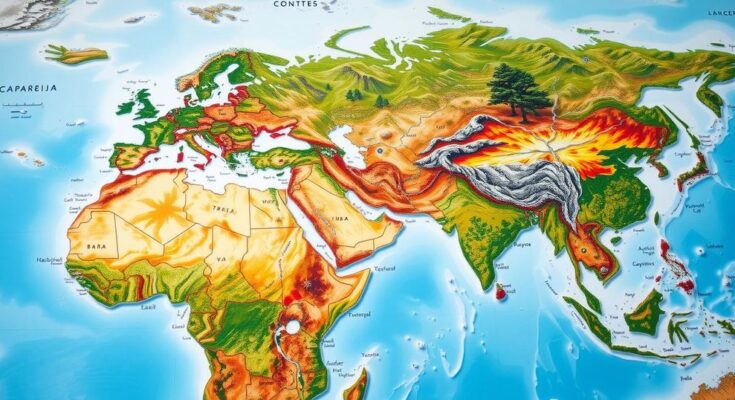Chile is longer than Europe, extending 2,500 miles and featuring diverse climates from desert to glacial landscapes. Home to nearly 20 million people, it supports rich biodiversity and offers attractions like Patagonia. Despite being recognized as safe, social conflicts regarding land rights exist, particularly with Indigenous communities. Additionally, Chile’s seismic activity presents challenges due to its location on the Pacific Ring of Fire.
Chile is an extraordinary country, extending 2,500 miles from the northern Atacama Desert to the southern Patagonia region, which is longer than Europe itself. With a population of nearly 20 million, Chile is renowned for its diverse landscapes, including magnificent beaches, towering mountains, and varied climates. The nation’s geography is dominated by its location along the Pacific coast of South America, nestled against the majestic Andes mountain range, resulting in an impressive range of climate types within its borders.
The climatic conditions found in Chile are remarkable, varying from the arid climate of the north to the temperate and damp environments in the south. The Atacama Desert, recognized as one of the driest places on Earth, contrasts sharply with the Mediterranean climate of the central region and the oceanic conditions found in the south, complete with alpine tundra and glaciers. Chile encompasses at least eighteen distinct climatic subtypes according to the Köppen classification.
In addition to its varied climates, Chile boasts rich biodiversity, with numerous species of wildlife, including pumas, foxes, and the Chilean condor. The Patagonia region, often referred to as a crown jewel for visitors, provides breathtaking treks and spectacular glaciers to explore. Moreover, Chile is home to the second-largest volcanic chain globally, situated within the volatile Pacific Ring of Fire, signaling its geological significance.
However, while Chile has been recognized as one of the safest countries within the Americas by the Global Peace Index, it is not without challenges. There exists an ongoing conflict involving Indigenous Mapuche land rights, particularly in the coastal range between Lebu and Temuco. This tension occasionally leads to disruptions, including road closures, highlighting the complexities surrounding land rights and political issues within the nation.
Chile’s seismic activity is another integral aspect of its identity; it is prone to earthquakes, including the historic 1960 Valdivia Earthquake, the most powerful ever recorded. Collectively, these facets illustrate Chile’s exceptional geographic, climatic, and cultural diversity, making it a captivating destination for travelers and researchers alike.
The article provides an overview of Chile’s remarkable geographical and climatic diversity. Chile is one of the longest north-south nations in the world, often compared to the length of Europe. Its extensive coastline along the Pacific Ocean, coupled with its diverse ecosystems ranging from deserts to glaciers, underscores its ecological significance. Additionally, the article touches on current social issues, particularly regarding Indigenous rights, which adds a layer of complexity to the country’s socio-political landscape.
In summary, Chile stands out for its extraordinary length, diverse climates, and vibrant wildlife, making it a significant destination in South America. While it is celebrated for its natural beauty and safety, challenges such as social conflicts concerning land rights must be acknowledged. Furthermore, its seismic activity highlights the need for preparedness and awareness of natural hazards. Overall, Chile presents a multifaceted portrait of beauty, challenge, and resilience.
Original Source: www.express.co.uk




